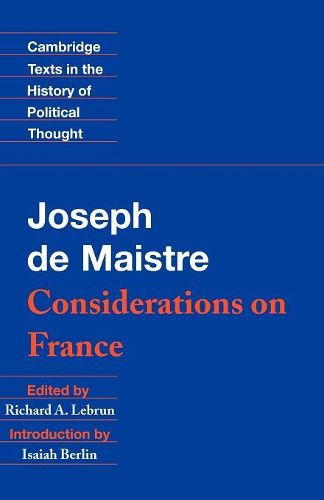Readings Newsletter
Become a Readings Member to make your shopping experience even easier.
Sign in or sign up for free!
You’re not far away from qualifying for FREE standard shipping within Australia
You’ve qualified for FREE standard shipping within Australia
The cart is loading…






Joseph de Maistre’s Considerations on France is the best known French equivalent of Edmund Burke’s Reflections on the Revolution in France. This new edition of Richard Lebrun’s 1974 translation is introduced by Isaiah Berlin, with a bibliography and chronology by the translator. Published in 1797, the work of the self-exiled Maistre presents a providential interpretation of the French Revolution and argues for a new alliance of throne and altar under a restored Bourbon monarchy. Although the Directory and then Napoleon delayed Maistre’s influence within France until the Restoration, he is now acknowledged as the most eloquent spokesperson for continental conservatism. Considerations on France was a shrewd piece of propaganda, but, as Isaiah Berlin contends, by arguing his case in broad historical, philosophical and religious terms, Maistre raises issues of enduring importance.
$9.00 standard shipping within Australia
FREE standard shipping within Australia for orders over $100.00
Express & International shipping calculated at checkout
Stock availability can be subject to change without notice. We recommend calling the shop or contacting our online team to check availability of low stock items. Please see our Shopping Online page for more details.
Joseph de Maistre’s Considerations on France is the best known French equivalent of Edmund Burke’s Reflections on the Revolution in France. This new edition of Richard Lebrun’s 1974 translation is introduced by Isaiah Berlin, with a bibliography and chronology by the translator. Published in 1797, the work of the self-exiled Maistre presents a providential interpretation of the French Revolution and argues for a new alliance of throne and altar under a restored Bourbon monarchy. Although the Directory and then Napoleon delayed Maistre’s influence within France until the Restoration, he is now acknowledged as the most eloquent spokesperson for continental conservatism. Considerations on France was a shrewd piece of propaganda, but, as Isaiah Berlin contends, by arguing his case in broad historical, philosophical and religious terms, Maistre raises issues of enduring importance.